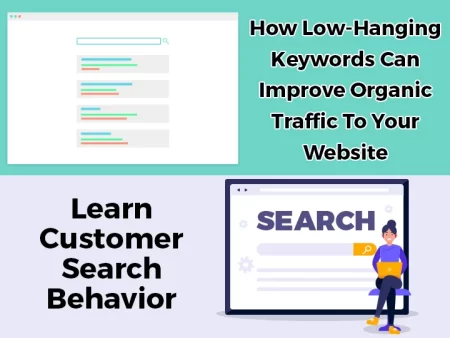 Dominating search results for important terms related to your business is often the primary goal today. Developing a keyword list and integrating them in articles is what most businesses and marketing organizations do. They track rankings of a website for those terms to evaluate the kind of leads they are generating.
Dominating search results for important terms related to your business is often the primary goal today. Developing a keyword list and integrating them in articles is what most businesses and marketing organizations do. They track rankings of a website for those terms to evaluate the kind of leads they are generating.
Both marketers and businesses know the frustration related to this process. You will be surprised to know that a simple correction to your approach of targeting low-hanging keywords can drastically improve your search marketing efforts. It will help you get better rankings and drive more traffic.
What are low-hanging keywords?
Although this terminology may differ from one platform to the other, a low-hanging keyword is a keyword that your website is within a reasonable distance of ranking for on the first page of search results.
For example, a keyword is supposed to be low-hanging if your website is ranking for it anywhere between 11-30 in the search engine results. Mostly such keywords are a phrase or question that seeks clarity and context such as “Tampa Solar Company.” Capitalizing relevant keywords that you believe your website can rank quickly within informative content and targeted optimization can work wonders. Low-hanging keywords usually represent an opportunity to rank better for a specific search query or a phrase.
Why should you target low-hanging keywords?
Marketers and businesses from competitive industries know the efforts needed to rank on the first page for highly competitive keywords. Despite knowing it most agencies and companies treat optimization for highly competitive terms as the best approach for search engine marketing.
Although it is important to rank for competitive keywords, it isn’t the only way to boost visibility and drive leads or traffic through search. More users might search online for “Tampa Personal Injury Lawyer,” but a considerable number of users in Tampa might also search for low-hanging keywords such as “When to hire a personal injury lawyer?” If you include low-hanging keywords in your content marketing and SEO strategies, there are multiple benefits.
Supports Priority Keywords
The most important benefit is that these search phrases or queries support the primary keywords used by you and your competitors. If Google thinks that your website features the best information for a particular keyword and supporting topics, you are more likely to rank better.
Learn Customer Search Behavior
Low-hanging keywords help marketers and businesses to learn more about customer search behavior. Unlike high-competitive keywords, low-hanging keywords are mostly a question or a phrase that seeks clarity and context. They allow you to properly optimize the content that customers often search. If you can deliver the best answer for a specific question, customers are more likely to remember you.
Represents The Customer Progression
As low-hanging keywords are mostly structured as phrases and questions, they represent the progression of a customer through the funnel of a prospective conversion. Particular questions indicate intent instead of somebody trying to familiarize with the industry and its offerings.
Less Competitive
Low-hanging keywords are less competitive and it is easier to be on the first page. It thus allows you to attract customers and drive more traffic to your website.
How To Optimize For Low-Hanging Keywords?
One of the most important benefits of using low-ranking keywords in your core SEO strategies is that those queries are directly derived from both the highly competitive keywords you are targeting and the performance of your website. You may use paid tools like Ubersuggest or SEMRush to track how your website is ranking for targeted keywords.
While optimizing your website and developing content, you will start noticing that your website is starting to rank for additional organic search terms. Ranking for such queries might not be a priority for any business but if ranking on them on second or third pages for terms aligning with the primary keywords, they are worth investing time and effort for. It can eventually boost your rankings and give a major boost to your business.
You may even leverage Google or free SEO tools for identifying additional opportunities. For example, AnswerThePublic shows you associated phrases and queries to the target keywords. Searching for such terms yourself lets you see the way your website ranks and identify the potential low-hanging keywords for driving your SEM.
You mustn’t go overboard with the keyword list. Targeting 10-50 keywords initially is a good place to start for most businesses. You can manage your marketing efforts better if you develop a focused keyword list.
In case you are looking to make the most of low-hanging keywords and other effective SEO strategies, you can consult experts at Affordable SEO Company Tampa. They are based in Tampa, FL, and have been helping businesses rank better on Search engines.
